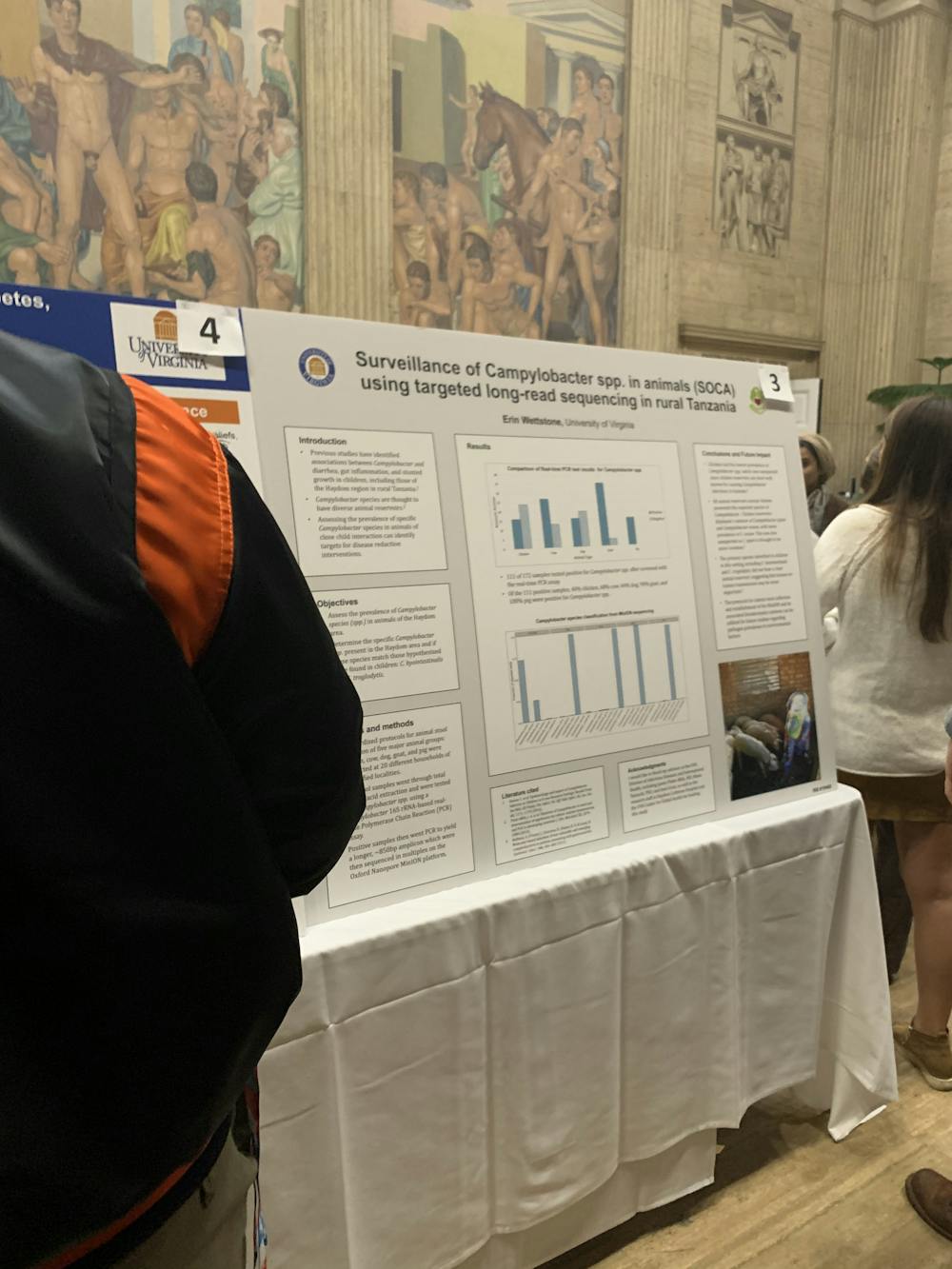Every year, University students work to solve a variety of global public health issues through engaging in research across the globe with funding from the University’s Center for Global Health. The CGH Research Symposium showcased the work of CGH University Scholars with a poster session Friday in Clark Hall. To close the symposium, Dr. Charles Reynolds III, a specialist in geriatric psychiatry, presented his research on the prevention of late-life depression and anxiety in low- and middle-income countries.
The symposium allowed students to teach others about global public health issues, their research and how to engage in interdisciplinary research in a global context. Additionally, the research symposium created an opportunity for networking with faculty and students involved in public health research.
The symposium included the research of students from a variety of different fields including in the College, Engineering School, Nursing School and School of Medicine. The locations of the research projects were also diverse as the CGH had research projects in Rwanda, Guatemala, Uganda, South Africa, Peru and the United States.
One project presented by fourth-year College student Sara Krivacsy was focused on a cervical cancer screening program in Rwanda. The researchers Krivacsy worked with at the University of Global Health Equity in Rwanda used a new screening method called careHPV, which detects human papillomavirus strains. HPV is a sexually transmitted infection that causes most types of cervical cancer.
“HPV screening is the gold standard for cervical cancer screening,” Krivacsy said.
She explained that not only is the screening more specific and sensitive than Pap smears, but it is also more accessible because it requires few resources. The screening needs little lab training and equipment and employs local, community health workers at every step of the screening process.
“7,000 women were screened and hundreds of women were detected and treated for precancerous lesions, so many lives were saved,” Krivacsy said.
On top of research in Rwanda, the CGH also supported research projects in Tanzania. Third-year Engineering student Erin Wettstone presented her research in rural Tanzania on the source of transmission of a pathogen called Campylobacter, which causes diarrhea and enteric diseases. Wettstone said that the pathogen especially affects children living in developing countries.
Wettstone hypothesized that the pathogen was transmitted through close contact with animals, since many of the kids spend most of the day working with them. She looked for the human strain of Campylobacter in the stool of chickens, cows, dogs, pigs and goats with DNA extraction and sequencing.
The researchers did not identify the human form of the pathogen in the animal reservoirs, so this project led them to conclude that other humans may be the main source of transmission, which could be a new focus for future studies.
“Once you know where a pathogen is transmitted from, you can start putting things out that prevent transmission, which can really help, especially in developing countries where malnutrition takes a high prevalence in people’s lives,” Wettstone said,
Another presenter at the symposium, fourth-year College student Cassandra Grello, spent seven weeks working as part of the U.Va. Guatemala Initiative to assess and improve the effectiveness of an electronic medical record system in the hospital of Totonicapan, Guatemala.
“[This hospital] treats many indigineous people and is a public hospital, so it lacks a lot of resources,” Grello said.
The electronic medical record system was introduced to the Guatemalan hospital in 2014, and Grello was part of the third team to evaluate its benefits and areas for improvement. Although her team could not address some issues such as poor internet and power outages, they were able to address many of the issues with the system by being liaisons between the users and system engineers.
For example, Grello said that one of the issues with the system was that diagnoses would be put into the system with many different spellings. Her team found the 25 most common diagnoses and coded them, making it easier for individuals making diagnoses and for the statistics department interpreting them.
The winner of the poster presentation was graduate student Kathy Nguyen for her research on the synergistic effects of silver and chlorine for point of use water purification in South Africa.
At the end of the symposium, Reynolds spoke about his research on how to prevent depression in the elderly in Goa, India. His team worked with people aged 60 and above who had mild, subsyndromal depression and anxiety.
One of the barriers to providing care in this area is that many of the participants were illiterate. Reynolds said his team circumvented this problem by creating pictorial flip charts that depicted images teaching the participants about their health, such as signs of diabetes.
The flip charts helped the researchers communicate with the local population in Goa, India.
“They themselves feel understood, too,” Reynolds said.
Reynolds ended his presentation with a quote from cultural anthropologist Margaret Mead, “We are continually faced with great opportunities which are brilliantly disguised as unsolvable problems.”
With Reynolds’s presentation, the CGH Research Symposium showed students an example of someone who addresses seemingly unsolvable problems through global public health research professionally. The symposium is held annually to introduce students, faculty and other guests to speakers like Reynolds and the interdisciplinary research students engage in.







